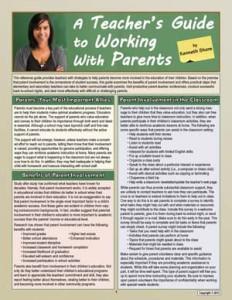A guest blog by Dr. Kenneth Shore, author of The Bullying Prevention Book of Lists, A Teacher’s Guide to Working with Parents, and others.
Most teachers learn a vital lesson soon after entering the classroom: you are more likely to have success teaching your students if you have a close working relationship with their parents. Put another way, parent support of their children’s education is the cornerstone of school success. Teachers are thus well-advised to focus not just on presenting engaging lessons but also on forging a partnership with parents founded on mutual respect, open communication, and an understanding of each other’s pressures and constraints. In this way teachers can help address issues with their students before they become larger problems.
 By building a connection with their students’ parents, teachers can learn key information that will help them work more effectively with their students, understand their educational and psychological needs, and learn about their strengths and weaknesses as well as any talents and interests they may have. Teachers may use this information to tailor lessons to the needs of their students and enhance their academic motivation. Similarly, a close working relationship with parents allows teachers to keep them updated on their children’s progress and offer suggestions for how parents can support their performance at home.
By building a connection with their students’ parents, teachers can learn key information that will help them work more effectively with their students, understand their educational and psychological needs, and learn about their strengths and weaknesses as well as any talents and interests they may have. Teachers may use this information to tailor lessons to the needs of their students and enhance their academic motivation. Similarly, a close working relationship with parents allows teachers to keep them updated on their children’s progress and offer suggestions for how parents can support their performance at home.
For simple, effective strategies for how to establish positive and productive relationships with parents, check out the quick-reference laminated guide A Teacher’s Guide to Working With Parents. It includes ideas for how to
- reach out to parents and offer ways they participate in the classroom
- communicate with parents at the beginning of the year, throughout the year on an ongoing basis, and when a student is struggling or excelling
- optimize parent-teacher conferences and back-to-school nights
- deal with angry or challenging parents
Among the recommended strategies found in the guide is sending home a newsletter for parents that includes items such as:
- Homework and test policies
- Grading policies
- Upcoming tests and projects
- Field trips and special events
- Learning activities for parents
- Expressions of appreciation
- Guest speakers
- After-school programs
- School-related web sites
- Upcoming birthdays
- Current instructional topics
- Homework hotlines
- Extra-curricular activities at school
- Suggested art and science projects
- Suggestions for dealing with cyberbullying
- Book recommendations for children and parents
- Community resources (for example, social service organizations and private tutors)








